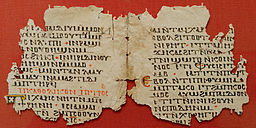Way too often, the God of the Bible punishes people not for what they’ve done, but for what other people have done.
God accuses Nazirites of “sinning” just because they happened to be nearby when someone else died. Unless all Nazirites are like Samson, that probably wasn’t the Nazirite’s fault.
God told Aaron that if other people got too close to God’s stuff, God would kill Aaron along with them. Likewise, Moses said repeatedly that God got angry at him because of what the people did.
God’s law says if you find a person who has been killed, and you don’t know who did it, you can just blame it on a cow. Break the cow’s neck, and God’s bizarre sense of justice will be satisfied. Who cares if the actual killer is still on the loose?
One time, God thought the Israelites deserved to die… but since he was biased in their favor, he decided to punish a bunch of other nations instead. God makes people drink from the cup of his wrath whether they deserve it or not.
God said because the king of Judah had broken a promise, the troops of Judah would be killed.
The book of Obadiah is all about what God’s planning to do to Edom. He says he’s going to turn everyone against that country and completely devastate them, and there will be no survivors. Why? It’s because of violence against Israel, but apparently the Edomites aren’t the ones who actually committed that violence. They just stood aloof while other nations invaded Israel. But God thought Edom was “like one of them”, and that was enough to make him want to kill all the Edomites.
Jesus (who the Bible says is God) found a man possessed by a legion of demons, which were tormenting the man. When Jesus confronted the demons, they expected to be tortured, or at least banished from the area. But Jesus didn’t end up punishing the demons at all. Instead, he let them do just what they wanted, which was to possess someone’s herd of 2000 pigs and make them drown themselves. So the innocent pigs died, and the innocent owner of the pigs lost his livestock. The demons, meanwhile, remained on the loose, let off the hook and free to continue causing trouble.
The Bible says God made an innocent man suffer and die for everyone else’s sins.
God had an angel kill Herod Agrippa because his subjects thought he was a god. Herod himself never said he was a god. God just killed him immediately after some other people said he sounded like a god. He didn’t even give Herod a chance to say what he thought about it.
Continue reading God punishes the wrong people